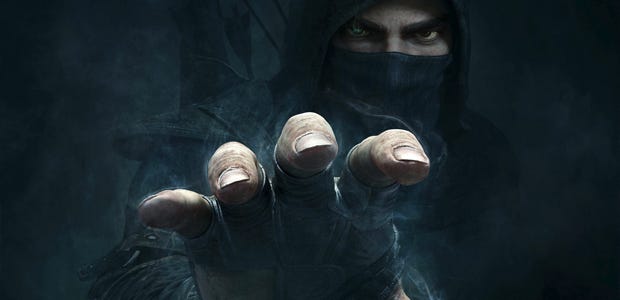The RPG Scrollbars: Great ideas more RPGs should steal
The respectable kind of thievery
They say that they who do not learn history are doomed to repeat it. When it comes to game design though, good ideas fall through the cracks and get forgotten all the time. This week then, I'm going to list a few of my favourite small features from classic or obscure games alike that I think would be cool to see more often, and quite probably ask you for a few of yours. Sounds like a plan? Excellent! Remember, we're looking for small, specific stuff rather than, say, 'good combat engine'. The kind of spark that perhaps only one or two games have ever tried, or which have faded for whatever reason over the years, but new games really should steal. Let's start obscure, with...
Clothes Matter - Hard To Be A God
Clothes are important in most games, though it's been a while since games routinely let you run your characters around in their underwear just to see what the NPCs had to say about it. For the most part though, that's all they've typically cared about. In something like Fallout for instance, nobody cares whether you're dressed as a dapper chap or a blood-soaked bandit, unless you count a minor Charisma penalty. Hard To Be A God is one of the few to really understand that in a dangerous world, people are going to make snap judgements. You dress as a bandit, and people will treat you like one, be it refusing to serve you, or allowing you into their camp. Finding the right outfit made for an excellent mechanic, minus the slight problem that like most... it forgot to factor in 'just underpants'. Very awkward when talking to old ladies.
Criminal Trials - Chrono Trigger/Conquests Of The Longbow
Two scenes I've always loved in games - correction for pedants, 'always' meaning 'after playing them, obviously' - are the courtroom sections of both Chrono Trigger and Conquests. They serve very different purposes. Chrono Trigger's is largely a gotcha, in which your actions at the very start of the game are used against you in a rigged court - whether you walked on the grass, helped a little girl, that kind of thing. Conquests of the Longbow meanwhile asks whether you actually played the role of Robin Hood as an honourable outlaw or simply a thug with delusions of grandeur. For instance, did you kill your enemies instead of merely humiliating them?
I've long wanted to see this kind of scene in an RPG done properly, where the game actually keeps track of people you've killed, houses you've broken into, all the stuff you've stolen, and throws it back at you. At the very least, you're not going to be able to complain when you find yourself on the 666 Express bound for the Bad Ending.
Uh. That said, maybe do it a little better than this...
Enemies That Don't Engage - Dark Age of Camelot
You know the guys I'm talking about. You're wandering through the capital city of some world when some bandits clad in rags glance over at your party of platemail covered fighters, mages buzzing with power, clerics humming with divine power and... bards there too. Anyway, they look at this team of hardened heroes who have slain gods and they decide, we can totally take these assholes. And it's so tiring! Even if you only have to swat them away, that's swatting time that could be so much better used getting on with business.
Single-player RPGs need a fairly common feature from MMOs, which is that at a certain point the trash mobs will just ignore you, or better yet, run screaming. However, to be more specific, I thought I'd expand this to a feature I really liked in Dark Age Of Camelot, where fighting certain monster types would win you brownie points... or pixie points or whatever... with their enemies, allowing your character safe passage through their space where another might get attacked. Obviously, there's factional version of this in MMOs, where the Horde will befriend one side of a conflict and the Alliance the other, but what I liked about the DAOC version was the sense that the faeries were looking down on you and going, nah, that one's alright. Let them get on with it. At least until you killed them for XP too.
Fight To The Defeat - Risen
Earlier games did this too, but Risen is the first where I really appreciated that the human characters weren't your usual RPG psychopaths with exactly two settings - "Hello, Friend!" and "WE MUST FIGHT TO THE DEATH!" For the most part, they don't want to kill you, and if you get into a fight, they'll deem honour satisfied by knocking you on your arse and stealing your wallet. It's a small thing, but it goes a long way to making the world more believable. Of course, if you actually do push them, all bets are off. And fair enough. But I'll still take falling down over every world being just one accidental shove away from turning into Falling Down.
Short Epics - Way Of The Samurai
Now, I don't actually like Way of the Samurai very much, but it's a good example of something that Japanese games do better than most Western ones - consider replay value. I know it's a question of taste, but I don't like that something like The Elder Scrolls will let a single character do literally everything if they want, up to and including being the head of the Thieves' Guild AND the Fighter's Guild. In general, I want to see more games exploring shorter-form stories but with far more scope for variance and surprise. A fifty hour game where you can do anything is a fifty hour game where not a whole lot of interesting stuff can happen. I'm not saying they shouldn't exist, but that it's past damn time we saw more five hour games that warranted repeat play and fit better into most of our modern gaming schedules.
Spellcrafting - Morrowind/Daggerfall
Now, I know what you're thinking. I've often complained that - say it with me - HEROES. DON'T. CRAFT. But that's the kind of crafting that should best be left to blacksmiths and the like. I make an exception for creating awesome magic spells out of parts - combining interesting effects and unleashing them on my foes. Especially with cheat codes to cut out any pesky safeguards or economic restrictions.
Transmogrification - World of Warcraft
Honestly, for 'transmogrification', read more or less anything that separates the stats of armour from their look. MMOs have long realised that most players want to have their own look in games rather than simply wearing the same stuff as everyone else on their tier, but it's been quite slow to make it across to single-player games. Isn't it boring when you reach the end of the game and everyone's basically wearing the same gear, maybe with a few mismatched parts and colours due to bad loot or just the designers not being fashion designers? Isn't it far more fun to just have a big wardrobe of awesome clothes to choose from, and give your character a look that you feel best represents them? Absolutely, it is! And if you disagree, you can always just wear stock armour like a dull person.
The Mule / Auto Sell Trash - Dungeon Siege
There is little more tedious than inventory management. Just allow a quick way of selling all the worthless crap and moving on. At this point, I am sure someone will ask "But what about the economy?" In response, I would like to gesture to the entire genre and very loudly go "HAHAHAHAHAHAHAHAHAHAHAHAHAHAHAHA."
Inconvenient Magic - Ultima / Original World of Warcraft
Okay, I'm definitely losing some of you here - but bear with me. I love magic users in games. They're my default, go-to class. However, while part of the appeal is the surface level hurling of fireballs and whatever, a deeper one is the sense of a character being connected to something important, something awesome, something primal. The more it comes down to just 'click an option from a list' or 'click the left mouse button', the more that's lost. Annoying as it sometimes was, I miss hunting for reagants in Ultima VII (take a shot) or the need for soul crystals in World of Warcraft. The latter especially, yes, I understand why they went bye-bye. But I still miss that sense of needing to prepare, along with other elements that make it a little riskier, like Wild Magic in D&D. I still think it's a shame that even The Witcher 3, a game I otherwise love dearly, didn't really have the guts to enforce the need for alchemy on anything but its highest difficult levels, and generally treated going up against something like a Vampire with the right equipment as cause for a damage bonus rather than an essential thing.
History - Darklands
Do I have to explain it? Our history is full of awesome periods for RPG goodness. Yet any time the concept comes up, it's still 1992's Darklands that everyone goes back to - and even that has dragons, witches, the Wild Hunt, kobalds and the like.
Creative Challenges - A Tale In The Desert
I add this one somewhat reluctantly, because I admit it's here more for the concept than its success over the years. However. A Tale in the Desert - launched way back in 2003 and still running - is a social MMO at least initially based on 'tests', like producing awesome fireworks displays, or proving yourself a good judge of character by burying cash in the desert, telling trusted people where to find it, and then hoping it's still there by the end of a timer expiring. While many of these offer fairly easy potential for rigging, it'd be cool to see more online games at least glance over what's been going on when working on community focused challenges.
Ongoing Single Player Adventures - Final Fantasy XV
Sorry for bringing consoles into this, but Square is finally doing something I've kinda wanted to see for a long time - continuing to add content to a single-player game after release. I don't just mean patching in more features, but adding time-limited content like a Chocobo Carnival that only ran for a few weeks. More is planned for later on. Like Hitman, it's a cool way of keeping players coming back, and a method with a lot of cool potential for events, special quests, holding celebrations outside of MMO spaces, and more.
Desperation - Pathologic
A big problem with most RPGs is that their difficulty is basically the opposite of what it should be. You start out weak, broke and clueless. By the mid-game, you've broken the economy over your knee, you know exactly how all your skills work, and usually the most the enemies can do about it is pack on the hit-points and lay down more fire not to walk in. I'm not saying I'd like all games to be along the Pathologic style, where every day brings fresh disaster and deprivation... but it's definitely a concept worth exploring in something other than its own remake. Or my pitiful attempts to play Dark Souls.
There's a few of mine. How about a few of yours?






















